Angel Time Read online
Page 16
“I hope you know that all we were accused of was a perfect lie. Imagine that we would take this little Christian child, crown him with thorns, pierce his hands and feet, and mock him as the Christ. Imagine. And that Jews would come from all over England to partake of such an evil ritual, and yet this is what we were told that we had done. Had not an unfortunate member of our race been tortured, and forced to name others, the madness might not have gone so far. The King came to Lincoln and condemned the poor unfortunate Copin who had confessed these unspeakable things and had him hanged, but not before being dragged through the town behind a horse.”
I winced.
“Jews were taken to London and imprisoned. Jews were put on trial. Jews died. And all for this fanciful story of a child tormented, and the child himself is now buried in a shrine perhaps more glorious than that of Little St. William who had the honor of being the subject of just such a tale many many years before. Little Hugh has all of England roused against us. The common people have made his story into songs.”
“Is there no place in this world safe for you?” I asked.
“I wonder the very same thing,” she answered. “I was in Paris with my father when Meir proposed marriage. Norwich has always had a good community, and long survived the tale of Little St. William, and Meir had inherited a fortune from his uncle there.”
“I understand.”
“In Paris, our sacred books were also burnt. And what was not burnt was given over to the Franciscans and to the Dominicans …”
She paused as she looked at my robes.
“Go on, please,” I said. “Don’t think I am in the least against you. I know that men in both orders studied the Talmud.” I wished I could remember more of what I knew.
“Tell me, what else has happened?”
“You know the great ruler, His Majesty, King Louis, detests us and persecutes us, and confiscated our property to finance his Crusade.”
“Yes, I know of these things,” I said. “The Crusades have cost the Jews in town after town and land after land.”
“But in Paris, our learned men, including my own kindred, fought for the Talmud when it was taken away from us. They appealed to the Pope himself and the Pope agreed that the Talmud might be placed on trial. Our story is not one of endless persecutions. We have our scholars. We have our moments. At least in Paris, our teachers spoke up eloquently for our sacred books, and for their general wholesomeness and that the Talmud was no threat to the Christians who might come in contact with us. Well, the trial was in vain. How can our learned men study when their books are taken from them? Yet in these times many at Oxford and at Paris want to learn Hebrew. Your brethren want to learn Hebrew. My father has always had Christian students around him—.” She broke off. Something had deeply affected her. She put her hand to her brow, and so instantly began to cry that I wasn’t prepared.
“Fluria,” I said quickly, restraining myself from any intimate touch that might strike her as improper. “I do know of these trials and tribulations. I know that usury was forbidden in Paris by King Louis and he drove out those who wouldn’t give in to the laws. I know why your people have turned to this practice and I know they’re in England now simply because of it, because they are deemed useful in lending to the barons, and to the church. You needn’t plead the case of your people before me. But tell me, what must we do to solve this tragedy we face now?”
She stopped crying. She reached into her robes and brought out a silk handkerchief and gently dabbed her eyes.
“Forgive me that I’ve gone on so. There is no place safe for us. Paris is no different, even with so many studying our ancient tongue. Paris is perhaps an easier place to live in some respects, but Norwich seemed peaceful, or so it did to Meir.”
“Meir spoke of a man in Paris who might help you,” I said. “He said only you could decide if you wanted to appeal to him. And, Fluria, I must confess to you. I know that your daughter, Lea, is dead.”
She broke down again and turned away from me, her handkerchief covering her face.
I waited. I sat still listening to the crackle of the fire, and letting her get over the worst of it, and then I said, “Long years ago, I lost my brother and sister.” I paused. “Yet I cannot imagine the pain of a mother losing a child.”
“Br. Toby, you don’t know the half of it.” She turned towards me again, and clenched her handkerchief tightly in her hand. Her eyes were soft and wide now. And she took a deep breath. “I have lost two children. And as for the man in Paris, I believe he would cross the sea to defend me. But I cannot say what he would do when he finds out Lea is dead.”
“Can’t you let me help you make this decision? If you decide you want me to go to Paris to this man, I will.”
She studied me for a long moment.
“Don’t doubt me,” I said. “I am a wanderer, but I do believe it’s the will of the Lord that I’m here. I do believe I have been sent to help you. And I will risk anything to do just that.”
She continued to ponder and rightly so. Why should she accept me?
“You say you’ve lost two children. Tell me what happened. And tell me about this man. Whatever you say to me can’t be used to hurt anyone, but only to help you think the matter through.”
“Very well,” she said. “I will tell you the whole tale, and maybe in the telling we’ll find the decision, because this is no ordinary tragedy we face, and this is no ordinary tale.”
CHAPTER NINE
Fluria’s Confession
FOURTEEN YEARS AGO, I WAS VERY YOUNG AND VERY rash and a traitor to my faith, and to all I hold dear. We were in Oxford then where my father was studying with several scholars. We went to Oxford often, because he had pupils there, students who wanted to learn Hebrew and paid him well as a teacher.
Scholars for the first time, it seems, in those days wanted to learn the ancient tongue. And more and more documents from olden days were coming to light. My father was in great demand as a teacher, and much admired by Jews and Gentiles alike.
He thought it a good thing for Christians to learn Hebrew. He disputed with them in matters of faith, but all this was friendly.
What he could not know was that I’d given my heart entirely to one young man who was just finishing the Arts at Oxford.
He was almost twenty-one, and I only fourteen. I conceived a great passion for him, enough to give up my faith, and my father’s love, and any wealth that was to come to me. And this young man loved me as well, so much so that he vowed he would give up his faith, if that’s what was required of him.
It was this young man who came to warn us before the Oxford riots, and we warned as many other Jews as we could to escape. If it hadn’t been for this young man, we might have lost a great deal more of our library than we did, and many valuable possessions as well. My father was devoted to this young man on account of that, but also in general because he loved this young’s man inquiring mind.
My father had no sons. My mother had died giving birth to twin boys, neither of whom survived.
This young man’s name was Godwin, and all you need know of his father is that he was a powerful earl, rich, and furious when he discovered that his son had become enamored of a Jewess, furious when he learned that his studies had put him in the company of a Jewish girl for whom he was ready to give up everything.
There had been a deep bond between the Earl and Godwin. Godwin was not the eldest, but he was his father’s favorite, and Godwin’s uncle, dying childless, had left to Godwin a fortune in France all but equal to that which his older brother, Nigel, was to inherit from their father.
Now his father took vengeance on Godwin for this disappointment.
He sent him to Rome to remove him from me and be educated there in the Church. He threatened to expose the seduction, as he called it, unless I never spoke the name of Godwin again and unless Godwin left immediately, and never spoke my name again aloud either. In truth, the Earl feared the disgrace that would come on him if it was known tha
t Godwin had a great passion for me, or if we were to attempt marriage in secret.
You can imagine the disaster that might have followed for all had Godwin really come over into our community. There have been converts to our faith, yes, but Godwin was the son of a proud and powerful father. Talk of riots! There have been riots for less than a nobleman’s son converting to our faith, and in these restless times when we are constantly persecuted.
As for my father, he did not know what we would be accused of, but he was as wary as he was enraged. That I might convert was unthinkable to him, and soon he made it quite unthinkable for me.
He felt that Godwin had betrayed him. Godwin had come under his roof, to study Hebrew, to talk philosophy, to sit at my father’s feet, and yet he had done this dastardly thing of seducing the great teacher’s daughter.
He was a man with a tender heart for me, as I was all that he had, but he was in a rage against Godwin.
Godwin and I soon realized our love was hopeless. We would bring riot and ruin no matter what we did. If I became Christian, I would be excommunicated, and my inheritance from my mother confiscated, and my father deserted in his old age, which was a thought I couldn’t bear. Godwin’s disgrace would not be much less than if he had converted to become a Jew.
So it was set and determined that Godwin would go to Rome.
His father let it be known that he still had dreams of greatness for his son, a bishop’s miter, certainly, if not a cardinal’s hat.
Godwin had kindred among the powerful clergy in Paris and in Rome. Nevertheless this was a severe punishment, this forcing of vows on Godwin, because Godwin had no faith in any Lord whatsoever and had been a very worldly young man.
Whereas I loved his wit and humor and his passion, others admired the amount of wine he could take in an evening and his skill with the sword, on horseback, and in the dance. In fact, his gaiety and charm, which so seduced me, were wound up with great eloquence, and love of poetry and song. He had written much music for the lute, and he had often played this instrument as he sang to me when my father had gone to bed and did not hear us in the rooms below.
A life in the church was something utterly unappetizing to Godwin. In fact, he would have preferred to take the cross and go crusading to the Holy Land, and find adventure there and along the way.
But his father would not equip him for that, and arranged to send him to the strictest and most ambitious of his clerical relations in the Holy City and told him to succeed in Holy Orders or be disowned.
Godwin and I met one last time, and Godwin told me then that we must never see each other again. He didn’t give two farthings for a great life in the church. He said his uncle in Rome, the Cardinal, had two mistresses. His other cousins he also regarded as blatant hypocrites, with appropriate contempt. “There are wicked and licentious priests aplenty in Rome,” he said, “and bad bishops and I’ll become another one. And with any luck I will someday join the Crusaders, and will in the end have all. But I won’t have you. I won’t have my beloved Fluria.”
As for me, I had come to realize that I could not leave my father, and I was filled with misery. My love for Godwin did not seem to be something I could exist without.
The more we vowed we could not have each other, the more incensed we became. And I think that night we were in the nearest danger of running off together, but we did not.
Godwin came to a plan.
We would write to each other. Yes, this was disobedience on my part to my father, no doubt of it, and certainly disobedience for Godwin, but we saw our letters as a means by which we might obey our parents with greater strength. Our letters, unbeknownst to our elders, would help us to accept their demands.
“If I thought we could not have that,” Godwin said, “the outpourings of our hearts in letters, I would not have the courage to leave here now.”
Godwin went to Rome. His father had made something of a peace with him, as he couldn’t bear to be angry with him. And so Godwin left one day quite early, without any further farewell.
Now my father, fine scholar that he was, and is, was nearly blind, which might account for how well educated I am, though I think I would be, even if he were not.
My point is that it was simple for me to keep our letters secret, but in truth, I thought Godwin would quickly forget me altogether, and be swept up into the licentious atmosphere into which he would surely be plunged.
In the meantime, my father surprised me. He told me that he knew Godwin would write to me, and he said, “I won’t forbid you these letters, but I don’t think there will be very many of them and you only mortgage your heart.”
Both of us were completely wrong. Godwin wrote letters from every town along his journey. Sometimes twice a day, the letters would arrive, by messengers both Gentile and Jewish, and I kept to my room whenever I could and poured out my heart with ink. In fact, it seemed we grew in our love through these letters and became two new beings, deeply bound to each other, and nothing, absolutely nothing, could drive us apart.
No matter. I soon had a greater worry than I’d ever anticipated. Within two months, the measure of my love for Godwin was perfectly plain to me and I had to tell my father. I was with child.
Another man might have abandoned me or worse. But my father has always doted on me. I alone survived of all his children. And I think there was a frank desire in him to have a grandson though he never spoke the words. After all, what did it matter to him that the father was Gentile if the mother was Jewish? And my father hit upon a plan.
He packed up our household and off we went to a small city in the Rhineland where there were scholars who knew of my father, but no kindred we could call our own.
There an elderly rabbi, who had much admired my father’s writing about the great Jewish teacher Rashi, agreed to marry me and to give out that the child born to me was his. He did this really from great generosity. He said, “I have seen so much suffering in this world. I will be father to this child, if you want it, and never claim a husband’s privileges as I am far too old for that.”
There I bore not one child by Godwin, but twins, two beautiful girls, both of exactly the same stamp, so alike that even I could not always tell one from the other, but had to tie a blue ribbon on the ankle of Rosa so that I could know her from Lea.
Now I know you would interrupt me if you could, and I know what you are thinking, but let me go on.
The old rabbi died before the children were a year old. As for my father, he loved these two baby girls, and he thanked Heaven that he still had some sight left to see their beautiful faces before he became completely blind.
Only as we returned to Oxford did he confess to me that he had hoped to place the babies with an aged matron in the Rhineland and had had to disappoint her because of his love for me and for the baby girls.
Now all the while I had been in the Rhineland, I had written to Godwin, but I had told him not one word about these baby girls. Indeed, I had given him vague reasons for the trip—that it had to do with the acquisition of books which were now hard to come by in France and England, and that my father was dictating quite a lot to me, and needed these books for the treatises that occupied his every thought.
The treatises, his every thought, and the books—all that was simple and true.
We settled into our old house in the Jewry of Oxford in the parish of St. Aldate, and my father commenced taking pupils again.
Since the secret of my love for Godwin had been crucial to all parties, no one knew of it, and they believed my elderly husband to have died abroad.
Now while I was traveling I hadn’t received Godwin’s letters, so there were many of them waiting for me when I came home. I set about opening them and reading them when the nurses had the children, and I argued with myself frantically as to whether I should tell Godwin about his daughters or not.
Was I to tell a Christian man that he had two daughters who would be brought up as Jewesses? What might his response have been? Of course he c
ould have bastards aplenty in the Rome he described to me and among his worldly companions for whom he had nothing but undisguised contempt.
In truth, I didn’t want to cause him misery, and I did not want to confess to him the sufferings I had endured myself. Our letters were filled with poetry, and the depths of our thoughts, undetached perhaps from realities, and I wanted to keep things this way because, in truth, this way was more real to me than day-to-day life itself. Even the miracle of these baby girls did not diminish my belief in the world we sustained in our letters. Nothing could.
But just as I weighed my decision to keep quiet with the greatest scrupulosity, there came a very surprising letter from Godwin, which I want to relate to you from memory as best I can. I have the letter here, in fact, but securely hidden among my things, and Meir has never seen it, and I cannot bear to take it out and read it so let me give you the substance of it in my own words.
I think my own words now are Godwin’s words, anyway. So let me explain.
He began again with his usual excursions of life in the Holy City.
“If I had converted to your faith,” he wrote, “and we were righteous man and wife, poor and happy, surely, that would be better in the eyes of the Lord—if the Lord exists—than a life such as these men live here, for whom the church is nothing but a source of power and greed.”
But then he went on to explain the strange occurrence.
He’d been drawn, it seemed, to one quiet little church over and over, where he sat upon the stone floor, his back to the cold stone wall, as he talked to the Lord contemptuously of the dismal prospects he saw for himself as a wenching and drinking priest or bishop. “How can you have sent me here?” he demanded of God, “to be among seminarians who make my former drunken friends in Oxford seem positively saintly?” He gnashed his teeth as he uttered his prayers, even insulting The Maker of All Things by reminding Him that he, Godwin, did not believe in Him and considered His church an edifice of the filthiest lies.
He went on with his heartless mockery of The Almighty. “Why should I wear the garments of Your church when I have nothing but contempt for all I see, and no desire to serve You? Why have You denied me the love of Fluria, which was the one pure and selfless impulse of my eager heart?”

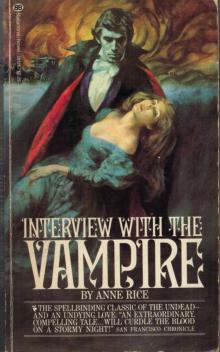 Interview with the Vampire
Interview with the Vampire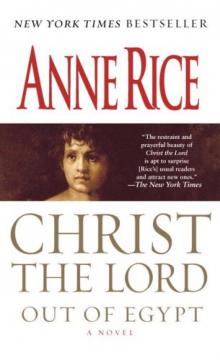 Christ the Lord: Out of Egypt
Christ the Lord: Out of Egypt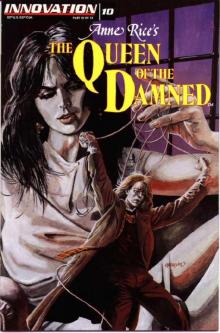 The Queen Of The Damned
The Queen Of The Damned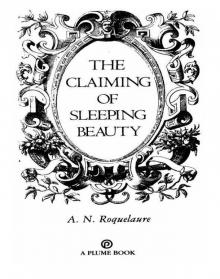 The Claiming of Sleeping Beauty
The Claiming of Sleeping Beauty Prince Lestat
Prince Lestat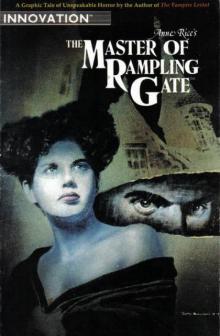 The Master of Rampling Gate
The Master of Rampling Gate The Vampire Lestat
The Vampire Lestat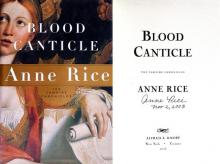 Blood Canticle
Blood Canticle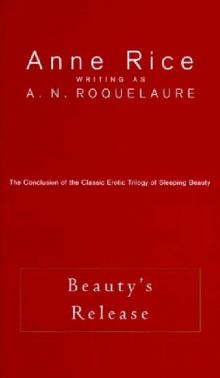 Beauty's Release
Beauty's Release Pandora
Pandora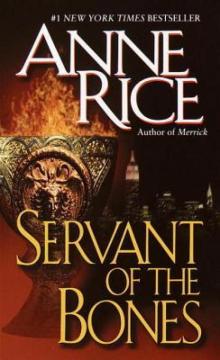 Servant of the Bones
Servant of the Bones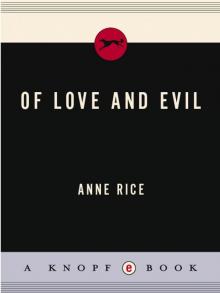 Of Love and Evil
Of Love and Evil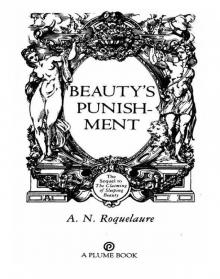 Beauty's Punishment
Beauty's Punishment Cry to Heaven
Cry to Heaven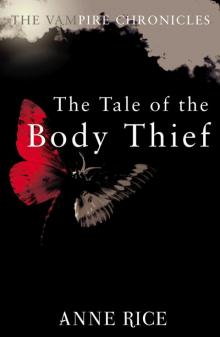 The Tale of the Body Thief
The Tale of the Body Thief The Witching Hour
The Witching Hour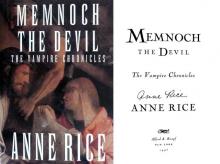 Memnoch the Devil
Memnoch the Devil Blackwood Farm
Blackwood Farm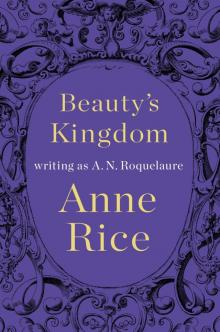 Beauty's Kingdom
Beauty's Kingdom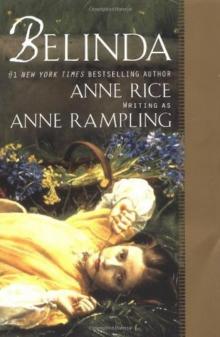 Belinda
Belinda Lasher
Lasher Vittorio, the Vampire
Vittorio, the Vampire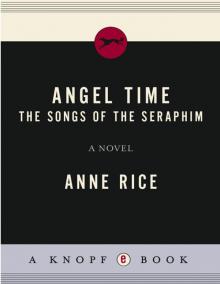 Angel Time
Angel Time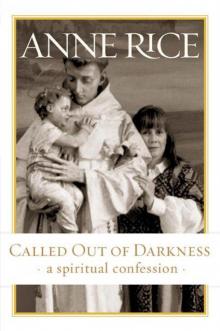 Called Out of Darkness: A Spiritual Confession
Called Out of Darkness: A Spiritual Confession Blood And Gold
Blood And Gold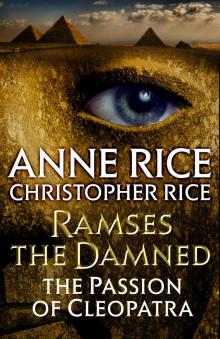 The Passion of Cleopatra
The Passion of Cleopatra Taltos
Taltos Exit to Eden
Exit to Eden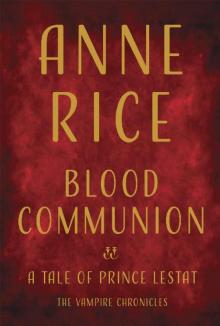 Blood Communion (The Vampire Chronicles #13)
Blood Communion (The Vampire Chronicles #13) The Wolf Gift
The Wolf Gift The Wolves of Midwinter
The Wolves of Midwinter Prince Lestat and the Realms of Atlantis
Prince Lestat and the Realms of Atlantis The Ultimate Undead
The Ultimate Undead The Vampire Lestat tvc-2
The Vampire Lestat tvc-2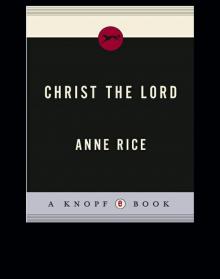 The Road to Cana
The Road to Cana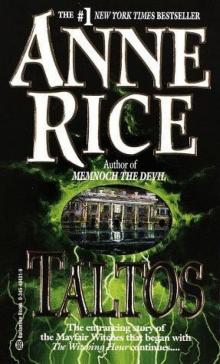 Taltos lotmw-3
Taltos lotmw-3 Merrick tvc-7
Merrick tvc-7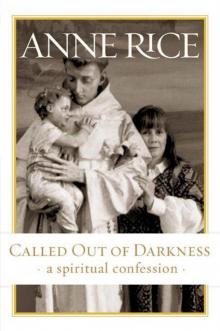 Called Out of Darkness
Called Out of Darkness Pandora - New Vampires 01
Pandora - New Vampires 01 Bllod and Gold
Bllod and Gold The Queen Of the Damned: Vampire Chronicles
The Queen Of the Damned: Vampire Chronicles The Sleeping Beauty Trilogy
The Sleeping Beauty Trilogy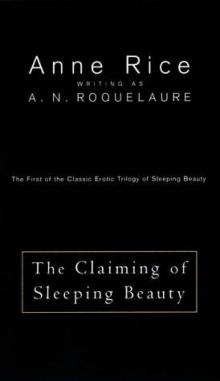 The Claiming of Sleeping Beauty b-1
The Claiming of Sleeping Beauty b-1 Lasher lotmw-2
Lasher lotmw-2 The Tale of the Body Thief tvc-4
The Tale of the Body Thief tvc-4 The Vampire Chronicles Collection
The Vampire Chronicles Collection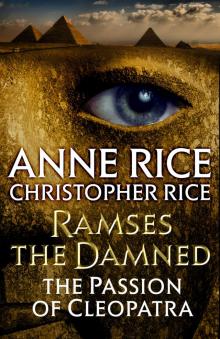 Ramses the Damned
Ramses the Damned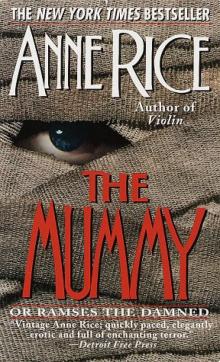 The Mummy - or Ramses the Damned
The Mummy - or Ramses the Damned Vittorio, The Vampire - New Vampires 02
Vittorio, The Vampire - New Vampires 02 The Vampire Armand tvc-6
The Vampire Armand tvc-6 Queen of the Damned tvc-3
Queen of the Damned tvc-3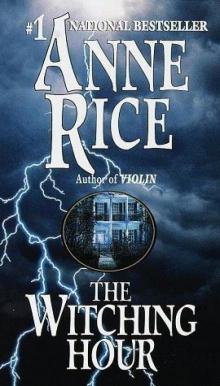 The witching hour lotmw-1
The witching hour lotmw-1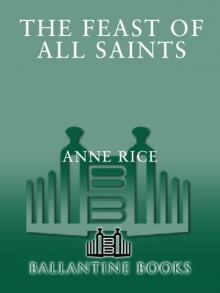 Feast of All Saints
Feast of All Saints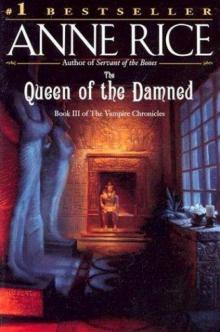 Queen of the Damned
Queen of the Damned The Wolves of Midwinter twgc-2
The Wolves of Midwinter twgc-2 The Mummy
The Mummy Blood and Gold tvc-8
Blood and Gold tvc-8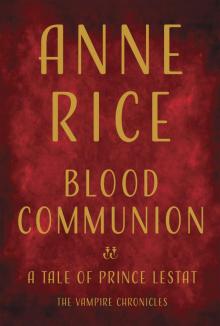 Blood Communion
Blood Communion Interview with the Vampire tvc-1
Interview with the Vampire tvc-1 Prince Lestat: The Vampire Chronicles
Prince Lestat: The Vampire Chronicles